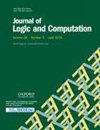Algorithmic properties of modal and superintuitionistic logics of monadic predicates over finite Kripke frames
IF 0.7
4区 数学
Q3 COMPUTER SCIENCE, THEORY & METHODS
引用次数: 0
Abstract
We show that the monadic fragment of the modal predicate logic of a single Kripke frame with finitely many possible worlds, but possibly infinite domains, is decidable. This holds true even for multimodal logics with equality, regardless of whether equality is interpreted as identity or as congruence. By the Gödel–Tarski translation, similar results follow for superintuitionistic predicate logics, with or without equality. Using these observations, we establish upper algorithmic bounds, which match the known lower bounds, for monadic fragments of some modal predicate logics. In particular, we prove that, if $L$ is a propositional modal logic contained in $\textbf{S5}$, $\textbf{GL.3}$ or $\textbf{Grz.3}$ and the class of finite Kripke frames validating $L$ is recursively enumerable, then the monadic fragment with equality of the predicate logic of finite Kripke frames validating $L$ is $\varPi ^{0}_{1}$-complete; this, in particular, holds if $L$ is one of the following propositional logics: $\textbf{K}$, $\textbf{T}$, $\textbf{D}$, $\textbf{KB}$, $\textbf{KTB}$, $\textbf{K4}$, $\textbf{K4.3}$, $\textbf{S4}$, $\textbf{S4.3}$, $\textbf{GL}$, $\textbf{Grz}$, $\textbf{K5}$, $\textbf{K45}$ and $\textbf{S5}$. We also prove that monadic fragments with equality of logics $\textbf{QAlt}^=_{n}$ and $\textbf{QTAlt}^=_{n}$ are decidable. The obtained results are easily extendable to the multimodal versions of the predicate logics we consider and to logics with the Barcan formula.有限克里普克框架上一元谓词的模态逻辑和超直觉逻辑的算法特性
我们证明,具有有限多个可能世界但可能是无限域的单一克里普克框架的模态谓词逻辑的单元片段是可解的。这一点即使对于具有相等性的多模态逻辑也是成立的,无论相等性是被解释为同一性还是全同性。根据哥德尔-塔尔斯基译法,无论是否平等,超直觉谓词逻辑都会得出类似的结果。利用这些观察结果,我们为一些模态谓词逻辑的单元片段建立了算法上界,与已知的下界相匹配。特别是,我们证明了,如果 $L$ 是包含在 $\textbf{S5}$、$\textbf{GL.3}$ 或 $\textbf{Grz.3 }$ 中的命题模态逻辑,并且该类有限 K}$ 并且验证 $L$ 的有限克里普克框架的类是递归可数的,那么验证 $L$ 的有限克里普克框架的谓词逻辑的具有相等性的单元片段是 $\varPi ^{0}_{1}$-完备的;特别是,如果 $L$ 是下列命题逻辑之一,那么这一点成立:$\textbf{K}$, $\textbf{T}$, $\textbf{D}$, $\textbf{KB}$, $\textbf{KTB}$, $\textbf{K4}$, $\textbf{K4.3}$、$\textbf{S4}$、$\textbf{S4.3}$、$\textbf{GL}$、$\textbf{Grz}$、$\textbf{K5}$、$\textbf{K45}$ 和 $\textbf{S5}$.我们还证明了具有相等逻辑的单元片段 $\textbf{QAlt}^=_{n}$ 和 $\textbf{QTAlt}^=_{n}$ 是可解的。所得到的结果很容易扩展到我们所考虑的谓词逻辑的多模态版本,以及具有巴肯公式的逻辑。
本文章由计算机程序翻译,如有差异,请以英文原文为准。
求助全文
约1分钟内获得全文
求助全文
来源期刊

Journal of Logic and Computation
工程技术-计算机:理论方法
CiteScore
1.90
自引率
14.30%
发文量
82
审稿时长
6-12 weeks
期刊介绍:
Logic has found application in virtually all aspects of Information Technology, from software engineering and hardware to programming and artificial intelligence. Indeed, logic, artificial intelligence and theoretical computing are influencing each other to the extent that a new interdisciplinary area of Logic and Computation is emerging.
The Journal of Logic and Computation aims to promote the growth of logic and computing, including, among others, the following areas of interest: Logical Systems, such as classical and non-classical logic, constructive logic, categorical logic, modal logic, type theory, feasible maths.... Logical issues in logic programming, knowledge-based systems and automated reasoning; logical issues in knowledge representation, such as non-monotonic reasoning and systems of knowledge and belief; logics and semantics of programming; specification and verification of programs and systems; applications of logic in hardware and VLSI, natural language, concurrent computation, planning, and databases. The bulk of the content is technical scientific papers, although letters, reviews, and discussions, as well as relevant conference reviews, are included.
 求助内容:
求助内容: 应助结果提醒方式:
应助结果提醒方式:


